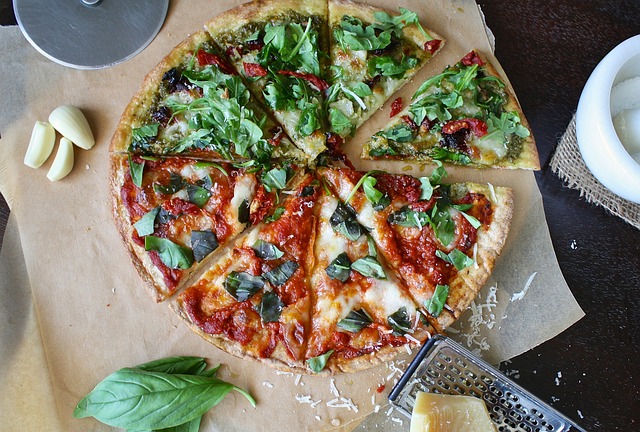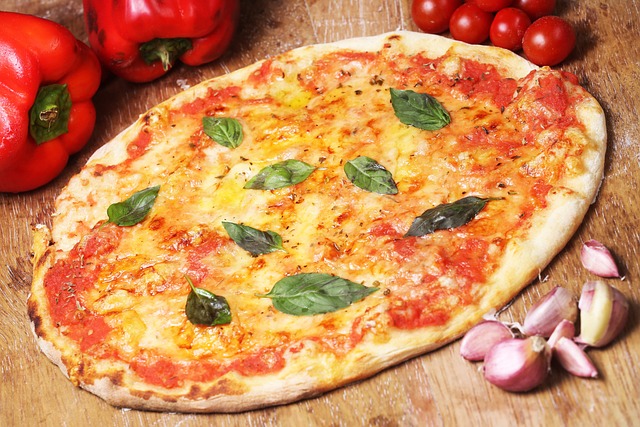Make Pizza at Home
Are you craving a delicious, homemade pizza that rivals your favourite pizzeria? Look no further! In this article, we’ll show you how to make pizza at home like a pro. From choosing the perfect dough and essential ingredients to mastering the art of stretching and shaping, we’ve got you covered.
Get ready to impress your taste buds with our crispy crust tips and explore creative recipes that will take your homemade pizza game to the next level. Let’s get started!
Choosing the Right Dough
When making pizza at home, choosing the right dough is essential. Whether you’re a fan of traditional crusts or looking for gluten-free alternatives, plenty of options are available to satisfy your cravings.
For those who desire innovation in their homemade pizzas, experimenting with different dough fermentation techniques can elevate their culinary skills.
If you’re looking for a gluten-free alternative, consider using rice flour and tapioca starch as the base for your pizza dough. This combination provides a light and crispy texture that will impress even the most discerning palates. Additionally, incorporating xanthan gum into the mixture will help bind the ingredients together and create a chewy consistency similar to traditional wheat-based dough.
For those who prefer traditional crusts but still crave innovation, experimenting with dough fermentation techniques can add depth of flavour and complexity to your homemade pizzas. One popular technique is cold fermentation, where the dough rises slowly in the refrigerator overnight. This extended fermentation process allows enzymes in the yeast to break down complex sugars into simple sugars, resulting in a more flavorful crust with hints of nuttiness and sweetness.
Choosing the right dough is essential when making pizza at home. Whether you opt for gluten-free alternatives or experiment with innovative fermentation techniques, your choice will significantly impact the final product. So go ahead and explore new possibilities—let your creativity run wild in creating delicious homemade pizzas that will leave everyone craving more!
Essential Ingredients for Homemade Pizza
To whip up a delicious homemade pizza, you’ll need essential ingredients like flour, yeast, water, and olive oil. But let’s not forget about the cheese! Choosing the right cheese is crucial to elevating your pizza game. While mozzarella is traditionally used on pizzas, don’t be afraid to experiment with different varieties like cheddar, provolone, or even feta for a unique twist.
Now that we’ve covered the cheesy goodness let’s discuss another essential aspect of homemade pizza: crust thickness. The thickness of your crust can significantly impact your pizza’s overall taste and texture. If you prefer a thin and crispy crust that allows the toppings to shine through, roll out your dough thinly and bake it at a higher temperature for a shorter time. On the other hand, if you’re a fan of thick and chewy crusts that have a satisfying bite, go for a thicker layer of dough and bake it at a lower temperature for a more extended period.

Mastering the Pizza Sauce
When mastering the perfect pizza sauce, you have a few critical decisions.
First, do you prefer tomato-based or marinara sauce? The choice will significantly impact the flavour profile of your pizza.
Next, should you use fresh tomatoes or canned tomatoes for your sauce? Fresh tomatoes can provide a brighter and more vibrant taste, while canned tomatoes offer convenience and consistency.
Lastly, do you like your pizza sauce spicy or mild? Adding heat can kick your pizza, but going too spicy might overpower the other flavours. Consider these factors as we delve into creating the ultimate pizza sauce.
Tomato or Marinara?
I’m unsure which sauce to use on the pizza – tomato or marinara.
Well, let’s break it down for you. Here are four key factors to consider when making this decision:
Taste: Tomato sauce is tangy and slightly sweet, while marinara has a richer flavour with added herbs and spices. It depends on your personal preference.
Consistency: Tomato sauce tends to be smoother and thinner, while marinara is chunkier. Think about whether you want a soft or textured sauce on your pizza.
-
Versatility: Tomato sauce works well with various toppings, from classic Margherita to meat lovers. Marinara is often used for pasta dishes but can also be a delicious choice for pizza.
Homemade vs. Store-bought: Making your sauce allows for customization and freshness, but store-bought options can save time and still deliver great flavour.
Ultimately, the choice between tomato and marinara depends on your taste preferences and whether you prefer homemade or store-bought options. Experiment with both sauces to find your perfect slice of pizza innovation!
Fresh or Canned?
Fresh tomatoes are the way to make your sauce if you want a more vibrant and authentic flavour.
Using fresh tomatoes versus canned ones can make a difference when making homemade pizza. Fresh tomatoes offer juicy sweetness and natural acidity that their canned counterparts cannot replicate. Not only do they bring unparalleled freshness to your pizza sauce, but they also add complexity and depth of flavour. On the other hand, canned tomatoes may lack the same level of brightness and robustness.
While convenience is a factor in our fast-paced lives, if you genuinely desire innovation in your homemade pizza experience, working with fresh tomatoes will elevate your culinary creation to new heights. So why settle for delivery or frozen pizzas when you can enjoy the authentic taste of homemade deliciousness?
Spicy or Mild?
Now that you’ve decided between fresh or canned ingredients for your homemade pizza, it’s time to consider the flavour profile.
Do you crave a fiery kick or a gentle sweetness? The choice between spicy and sweet toppings is entirely up to you. If you’re adventurous and love bold flavours, go for spicy toppings like jalapenos, hot sauce, or chilli flakes. These will add an exciting punch to your pizza, leaving your taste buds craving more.
On the other hand, if you prefer a milder taste that pleases everyone’s palate, opt for sweet toppings like caramelized onions, pineapple chunks, or honey glaze. Your homemade pizza allows you the freedom to experiment with flavours and find the perfect balance of heat and sweetness that satisfies your cravings.
But wait! Before ordering delivery with pre-set topping options, remember that making your pizza at home gives you complete control over every aspect of your creation – including the choice between spicy and sweet toppings. By making it yourself from scratch, you can customize each pizza element and get creative by combining spicy and sweet flavours in unique ways. For instance, add some sliced jalapenos and pineapple chunks for a compelling combination of heat and sweetness.
With homemade pizza, the possibilities for exploring new flavour combinations are endless. So why settle for predefined options when making your masterpiece? Prepare to embark on a culinary adventure by crafting a customized pizza experience that suits your taste preferences!
Exploring Topping Options
Are you tired of the same old pizza toppings? Get ready for a culinary adventure as we explore the world of unique topping combinations. From unexpected flavour pairings to vegetarian-friendly options, there’s something for everyone to enjoy.
Whether you’re a meat lover or prefer a plant-based diet, we’ve got you covered with creative and delicious ideas that will take your pizza game to the next level.
Unique Topping Combinations
One of the best things about making pizza at home is experimenting with unique topping combinations. When it comes to vegetarian pizza options, the possibilities are endless! You can create innovative and delicious flavour pairings that will leave your taste buds wanting more.
How about trying a combination of roasted butternut squash, caramelized onions, and tangy goat cheese? Or perhaps you prefer a Mediterranean-inspired pizza with artichoke hearts, sun-dried tomatoes, and feta cheese. Try topping your pizza with arugula, cherry tomatoes, and creamy mozzarella for freshness. Don’t be afraid to think outside the box and mix unexpected ingredients. The key is to balance flavours and textures for an unforgettable homemade pizza experience. So go ahead and get creative in your kitchen!
Vegetarian Pizza Options
Why not try experimenting with unique topping combinations for your vegetarian pizza? Vegetarian pizzas offer a world of possibilities for delicious and innovative toppings. Here are some ideas to get your creative juices flowing:
Classic Vegetable Combo:
-
Roasted bell peppers
-
Sautéed mushrooms
-
Fresh spinach
-
Red onions
Mediterranean Twist: -
Sun-dried tomatoes
-
Kalamata olives
-
Feta cheese
-
Artichoke hearts
Don’t forget to pair these toppings with a homemade pizza crust that complements their flavours. You can choose from whole wheat, cauliflower, or gluten-free crusts. Homemade crusts allow you to control the ingredients and create a base that perfectly suits your taste preferences. So unleash your culinary creativity by exploring new vegetarian pizza topping combinations on your homemade crust!
Creative Flavor Pairings
Don’t limit yourself to traditional flavour pairings – try experimenting with unexpected combinations that can take your vegetarian pizza to a whole new level of deliciousness!
The possibilities are endless for creating unique and innovative flavours for your vegetarian pizza. Consider pairing tangy goat cheese with sweet caramelized onions or spicy jalapenos with creamy avocado.
How about combining earthy mushrooms with zesty pesto or tangy feta cheese with juicy roasted tomatoes? Don’t be afraid to think outside the box and mix different textures and tastes.
The key is to balance flavours and create a harmonious blend that will tantalize your taste buds. So get creative in the kitchen and elevate your vegetarian pizza game by trying these exciting flavour combinations!
The Art of Stretching and Shaping the Dough
Start by gently stretching and shaping the dough with your hands to achieve the perfect pizza crust. This step is crucial in creating a thin, crispy base that holds all your delicious toppings. The way you handle the dough can significantly affect its texture and elasticity.
When stretching the dough, remember to be gentle yet firm. Here’s a simple stretching technique to help you get started:
- Place the ball of dough on a lightly floured surface.
- Using your fingertips, gently press down on the center while pushing outwards towards the edges.
- Rotate the dough as you go, ensuring an even thickness throughout.
- Continue stretching until you reach your desired size.
It’s important to note that dough elasticity plays a crucial role in achieving a light and airy crust. You want a dough that stretches easily without tearing or springing back too much. If your dough lacks elasticity, try adjusting the hydration level or kneading it for longer.
Baking Your Pizza to Perfection
Now that you’ve mastered stretching and shaping your pizza dough, it’s time to move on to the next step in creating a perfect homemade pizza: baking it to perfection. This is where all your hard work pays off, and you enjoy a delicious, crispy crust topped with mouthwatering flavours.
To achieve the ideal bake, preheat your oven to its highest temperature. A hot range ensures the crust cooks quickly and evenly, resulting in that desirable crunch. If you have a pizza stone or steel, place it in the oven during preheating to help mimic the intense heat of a professional pizza oven.
When it comes to mastering pizza toppings, there are endless possibilities. Get creative and experiment with different combinations of ingredients. Whether you prefer classic Margherita or want to try something more adventurous, like barbecue chicken or buffalo cauliflower, do not overload your pizza with too many toppings, as this can lead to a soggy crust.
One crucial aspect of any great pizza is achieving the perfect cheese melt. To accomplish this, distribute high-quality mozzarella cheese evenly across your pie. Add other cheeses like Parmesan or Gouda for an extra gooey texture and added flavour.
Baking time will vary depending on your oven’s temperature and the thickness of your crust, but it typically takes 10-15 minutes. Keep an eye on your masterpiece as it bakes until the crust turns golden brown and the cheese bubbles up enticingly. With these tips, you’re well on your way to becoming a master pizzaiolo right in the comfort of your kitchen!
Tips for Achieving a Crispy Crust
Ensure your oven is preheated to the highest temperature possible for a perfectly crispy crust. Ensuring a pizza stone is the key to achieving a deliciously crisp pizza crust.
When choosing the suitable flour, choose a perfectly crispy crusty protein flour like bread or tipo 00 flour. These flours have more gluten, which helps create a chewy and crispy crust. Avoid all-purpose flour, as it has lower protein content and may result in a softer crust.
Next, consider investing in a pizza stone. A pizza stone absorbs moisture from the dough, allowing for better heat distribution and a crispier crust. Preheat your pizza stone with your oven to reach its maximum temperature.
Place the pizza stone on the lowest rack of your oven while preheating with your range. Using a peel or baking sheet, reach the pizza onto the hot stone. The hot surface will immediately start cooking the bottom of your crust, creating that desired crunchiness.
Creative Pizza Recipes to Try at Home
Get creative with your toppings and experiment with unique flavour combinations to elevate your pizza game. When it comes to choosing unique toppings, the possibilities are endless. Why not try something out of the ordinary, like prosciutto and figs, for a sweet and savoury twist? Or how about caramelized onions, blue cheese, and arugula for a bold and tangy flavour explosion? Don’t be afraid to think outside the box and let your imagination run wild.
But it’s not just about the toppings; experimenting with different cheeses can take your pizza to a new level. Instead of the usual mozzarella, why not use goat cheese or feta for a creamy and tangy kick? Or mix things up by combining different types of cheese like cheddar, Gouda, and Parmesan for a complex and rich flavour profile.
To make your homemade pizza unique, add unexpected ingredients like roasted garlic, truffle oil, and fresh herbs like basil or cilantro. These little touches can make all the difference in creating a memorable and delicious pizza experience.
So step out of your comfort zone and get adventurous with your pizza creations. With so many exciting options, you’ll never be bored with plain old pepperoni again!




